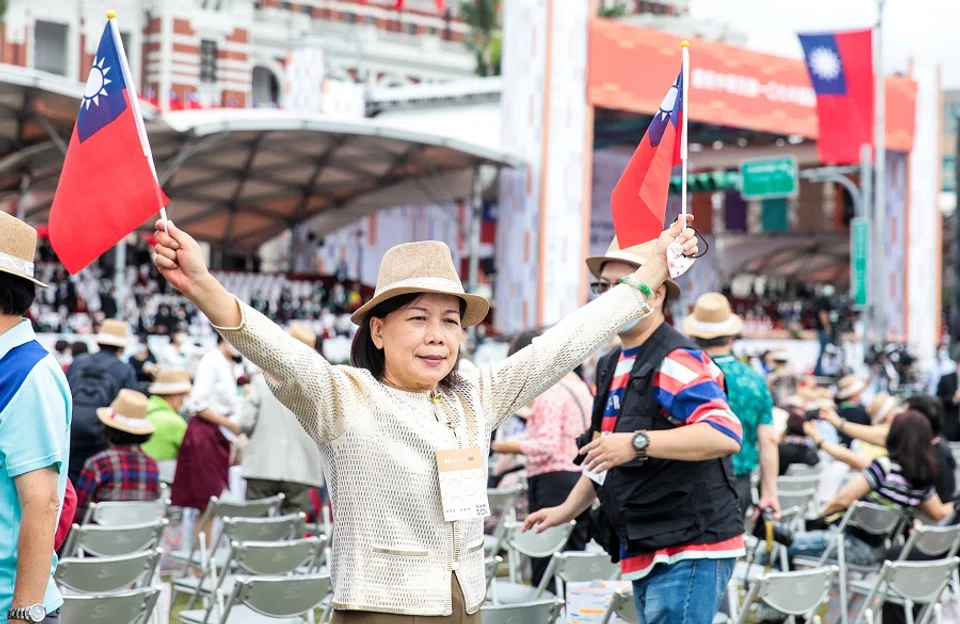Why Taiwanese are pro-Japan but anti-China
Deng Qingbo observes that despite sharing the same language and ethnicity as the mainland Chinese, the Taiwanese have been quicker to imbibe Japanese culture than Chinese culture per se. He sees that mainland China has a lot of catching up to do if it is to win the hearts and minds of the Taiwanese and reclaim some of the admiration it once enjoyed in areas such as civilisational development, culture, and literature.

Two resolutions by Taiwan's Kuomintang (KMT) calling respectively for the government to "request the help of the US in resisting the Chinese Communist Party (CCP)" and for "the resumption of diplomatic relations between Taiwan and the US" were unanimously passed in the Legislative Yuan.
Mainland Chinese media personality and Global Times editor Hu Xijin had this reaction: "Judging from such a loser mentality of the KMT, it is clear that we must not count on them for future cross-Straits peace and national reunification... We must no longer hold any more illusions. The only way forward is for the mainland to fully prepare itself for war and to give Taiwan secessionist forces a decisive punishment at any time."
At present, cross-strait relations have hit a new low. With the ruling Democratic Progressive Party (DPP) and Tsai Ing-wen fully leaning towards the US in fighting against mainland China, US President Donald Trump sending senior officials to Taiwan, as well as American arms sales to Taiwan that have repeatedly violated the "one China" policy, mainland Chinese public opinion is sounding increasingly anxious and more mainlanders are in support of "fully preparing itself for war".

Meanwhile, all national flags at government institutions were flown at half-mast on 7 October, during former Taiwan President Lee Teng-hui's state funeral attended by Tsai and other government officials. Even though Lee had once declared that he was a Japanese when he was alive, and had even proposed that the Senkaku/Diaoyu Islands belonged to Japan, he was nevertheless honoured by Taiwan authorities and the ruling and opposition parties after his death.
Taiwanese are not only "resenting" and "resisting" mainland China but going to the point of pronouncing "guilt by association".
At the same time, Taiwan artiste Ouyang Nana's performance of the song "My Motherland" (我的祖国) at CCTV's National Day gala in commemoration of the 71st anniversary of the founding of the People's Republic of China incurred the wrath of the DPP. It announced that an investigation was underway to determine if her actions violated Taiwan law. The Taiwanese people vented their frustrations online, and even Ouyang's elder sister was not spared from the netizens' fury. During the 2016 presidential campaign, Tsai said that if she became president, no one would need to apologise for their beliefs. Looking at the current turn of events, it seems like her declaration was empty talk. Taiwanese are not only "resenting" and "resisting" mainland China but going to the point of pronouncing "guilt by association".

Mainland China befuddled at Taiwan's admiration for Japan
The above examples reflect a Taiwanese society that tolerates pro-Japan behaviour but treats those who are pro-China as its sworn enemies. This is unfathomable to the mainland Chinese. They cannot understand why even though both sides of the Taiwan Strait use the same language and are of the same ethnicity, most Taiwanese are instead pro-Japan despite having been under Japanese colonial rule and do not want to call themselves Chinese. Because of this quandary, some mainlanders may be disappointed by what they hear of Taiwan public opinion and be swayed by Hu's proposal to "fully prepare itself for war".
As an academic who has observed Taiwan affairs for a long time, I recently watched the Taiwanese film 27°C - Loaf Rock, a story about Taiwanese master baker Wu Pao-chun. Perhaps this story can help us understand why some Taiwanese are pro-Japan but anti-China to a certain extent.
Wu won the world championship title in the 2010 Les Masters de la Boulangerie in Paris and has since been hailed as the "Glory of Taiwan" (台湾之光) by Taiwan media. However, he was once in a similar plight as Ouyang. In 2016, he was misquoted by a pan-Green Taiwan media as saying that he would rather starve than open a branch in the mainland, when he had originally said, "Although the mainland market has over 1.3 billion customers, the world's market has over seven billion. I won't keep my eyes only on China." Thus, when he sought to expand his business to Shanghai and was conducting a trial run in 2018, Chinese netizens questioned if he was supportive of "Taiwan independence". Wu said that he was proud to be Chinese.
Undoubtedly, compared to mainland China, Japan - a developed country - has influenced Taiwan society in three ways.

Despite Wu saying that, it is obvious that the film 27°C - Loaf Rock includes various Japanese references. For example, it says in the film that Wu's baking skills greatly improved after he went to Japan to upgrade himself. Also, people are seen bowing to one another as a form of politeness in the film, which is a clear nod to Japanese mannerisms. Finally, the aesthetics and narrative style of the film is heavily influenced by Japanese films.
Undoubtedly, compared to mainland China, Japan - a developed country - has influenced Taiwan society in three ways. First, through Japan's civilisational development. The Taiwanese are greatly inspired to learn from Japan's advanced development, whether in terms of craftsmanship or technology. After all, Wu the baker was keen to upgrade his skills there. Second, through Japan's culture. As Taiwan was once colonised by Japan, many of Japan's philosophies and ways of life have taken root in Taiwan society and persevered even after the war. Moreover, as parts of Chinese and Japanese culture have common origins, Japanese culture may have been taken for Chinese culture and adopted in people's lives. For example, while bowing is no longer a social etiquette in mainland China, its use in Taiwan shows that the Taiwanese are more aligned with Japanese social etiquette.
And finally, third, through Japan's literature, in a broad sense of the word, including film narratives and various modes of expression. As a developed country, Japan's pop culture including its music, movies, and novels have been at the forefront of Asian culture for a long time. As both Japan and Taiwan are capitalist societies, Japan's ways of expression are also more easily accepted by Taiwan society.

Failing to strike a chord with Taiwan society
Taking the Taiwanese film 27°C - Loaf Rock as an example, the extraordinary life of an ordinary man is depicted in the film, through an emotional story of personal struggle and hard-won success. This is starkly different from the grand narrative of many Chinese films which speak of the nation and other affairs collectively. Such an intimate style of storytelling makes it easier to strike a chord with a Taiwan society that is easily stirred up by the small blessings and little happiness in life.
Fundamentally, the current alienation of some Taiwanese, especially the younger generation, from mainland China is closely related to the division between both sides of the Taiwan Strait for more than a century since Japan colonised Taiwan, as well as the cultural and educational "de-sinicisation" that has been ongoing for one-third of a century since the time of Lee's presidency. It is the result of political manipulation and persuasion from politicians. However, mainland China does indeed have great room for improvement if it wants to influence Taiwan in the aspects of civilisation, culture and literature.
Tsai is even conducting an "ideological review" and banning mainland China streaming services like iQIYI and so on, which firmly illustrates that the mainland is asserting a greater cultural influence on Taiwan.

Pop culture to the rescue
Evidently, as mainland China's reform and opening up deepens and as its national power increases, its influence on Taiwan in the three aforementioned aspects is also growing. In the past, Hong Kong and Taiwan pop culture were highly sought after in the mainland. Now, mainland films, dramas and programmes are instead becoming popular in Taiwan. Tsai is even conducting an "ideological review" and banning mainland China streaming services like iQIYI and so on, which firmly illustrates that the mainland is asserting a greater cultural influence on Taiwan.
However, the mainland is still developing and in the process of becoming stronger. While its hard power such as the military has advanced, its soft power like the level of civilisation, as well as its cultural and literary standards, are still far from becoming well-developed.
Hu and his supporters should instead rack their brains and contribute constructive ideas on how a "cultural offence" can be achieved.
Better to play 'military defence' or 'cultural offence'?
Rather than a "military defence", a "cultural offence" along the lines of civilisation, culture, and literature will clearly be a better way to go in fostering a meeting of the minds between the peoples of mainland China and Taiwan, and bring long-term benefits to both societies.
To "fully prepare itself for war" as Hu and his supporters advocate, is definitely not the "only way forward" in the mainland's policy towards Taiwan. Such thinking could instead diminish China's influence in the civilisation, culture and literature realms. Not only is it unhelpful in boosting "military defence" since the military is an important asset of the country and should not be used as noisy sabre-rattling, it is also not helpful on the "cultural offence" front since it disregards the root cause of cross-strait tension and instead encourages populist opposition between both sides. Hence, Hu and his supporters should instead rack their brains and contribute constructive ideas on how a "cultural offence" can be achieved.
...the alienation of the current generation of Taiwanese from the mainland is because mainland China has never truly reclaimed its civilisational, cultural, and literary dominance in Taiwan.

If the reason why the generation of Taiwanese in Lee's era had once considered Japan their motherland is because they grew up under Japanese colonial culture, then we can say that the alienation of the current generation of Taiwanese from the mainland is because mainland China has never truly reclaimed its civilisational, cultural, and literary dominance in Taiwan. Amid potential provocation from the Trump administration and pro-Taiwan independence politicians, while military preparation is necessary, the mainland should firmly persist in "counting on the Taiwanese" more than ever, and quickly enhance its level of civilisational development, cultural strength, and literary standards to win over Taiwan society.
At present, we should focus on finding ideals advocated by the mainland including democracy, freedom, equality, justice, rule of law, integrity, friendship and so on, that are compatible with Taiwanese values if communication and interaction are to be strengthened. In this way, not only can more "Ouyang Nanas" truly emerge after Lee's death, China would also gain understanding and acceptance from the Taiwanese as a result.
Related: The only way out for the Taiwan issue | Chinese academic: A 'reunification by force' would be Taiwan's last | Will the US abandon Taiwan? | Taiwan would once again be abandoned amid China-US competition | [Photo story] Lee Teng-hui: Controversial figure or icon of Asian democracy? | Taiwan history textbooks makeover: Eliminating country, people, history and culture?




![[Photos] Fact versus fiction: The portrayal of WWII anti-Japanese martyrs in Taiwan](https://cassette.sphdigital.com.sg/image/thinkchina/3494f8bd481870f7c65b881fd21a3fd733f573f23232376e39c532a2c7593cbc)
